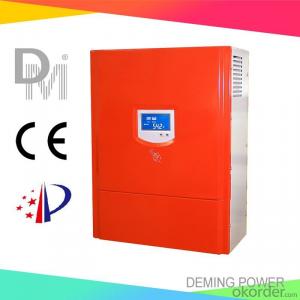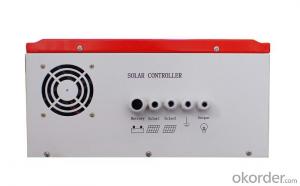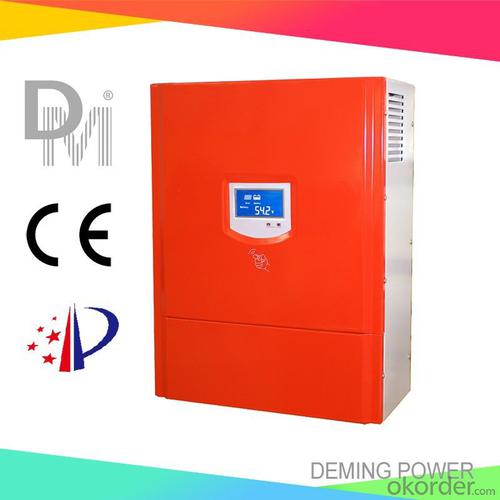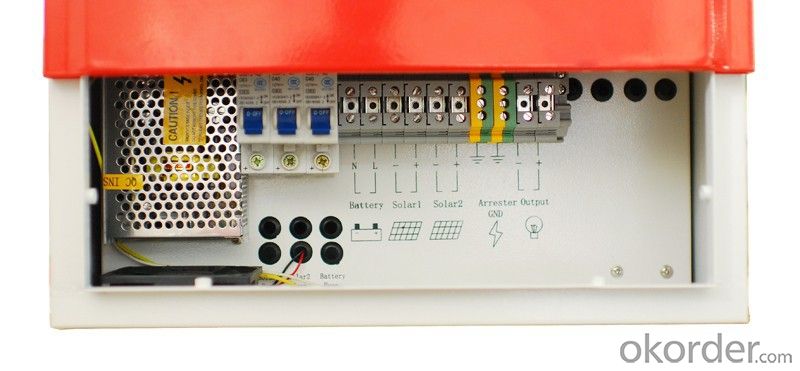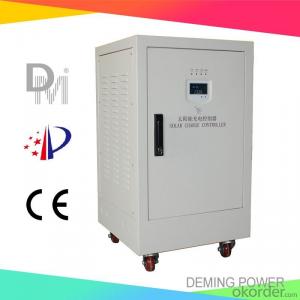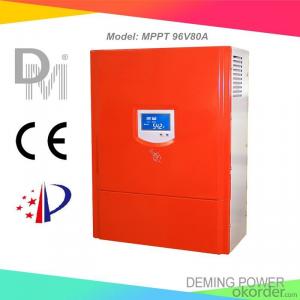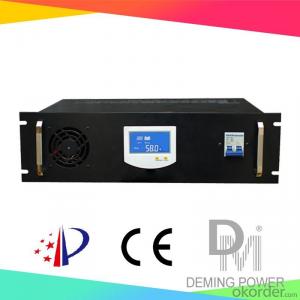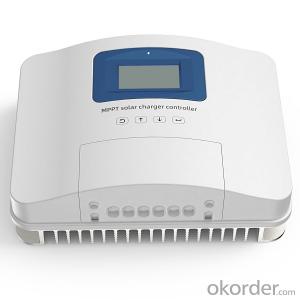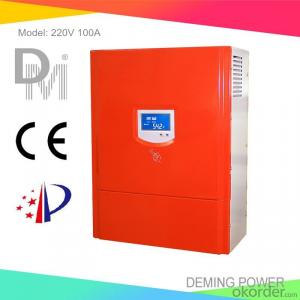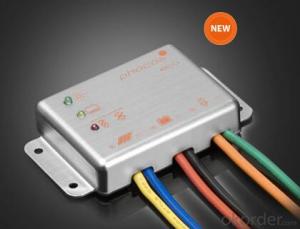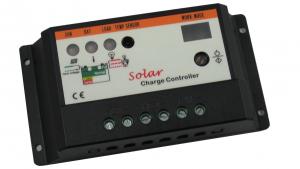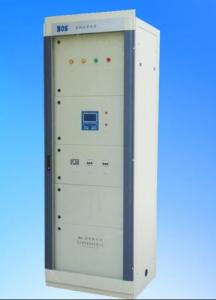Solar Panels and Controllers:MPPT Solar Charge Controller 96V 100A with Best Price for Solar Power System
- Loading Port:
- Qingdao
- Payment Terms:
- TT OR LC
- Min Order Qty:
- 1 PCS
- Supply Capability:
- 1000 PCS/month
OKorder Service Pledge
OKorder Financial Service
You Might Also Like
Properties of the solar charge controller
1. Design for off-grid solar power system.
2. Applicable to different kinds of batteries.
3. Adopts MPPT technology (Maximum Power Point Tracking). The advanced tracking algorithm make the solar module operate at ideal voltage which the solar modules can produce the maximum available power.
4. Modular design with simple structure and easy maintenance.
5. Automatic power control function.
6. LCD display: Solar panel current, solar panel voltage, solar panel power, battery group voltage, charge current.
7. Perfect protection function: Solar reverse charge protection, Solar reverse connection protection, Battery reverse connection protection, Battery overcharge protection, Battery over current protection etc ,thus the system has higher reliability.
Technical parameters of the solar charge controller
Model | 96V100A | |||||
Battery group rated voltage | 96Vdc | |||||
PV Rated current | 100A | |||||
PV open circuit voltage | 400V | |||||
PV Max. power | 9600Wp | |||||
Input PV module road number | 1 | |||||
Function | MPPT charge mode, auto stop charge, auto recharge voltage; Protection: connecting contrary, over current, short circuit, over heat etc. | |||||
Display mode | LCD | |||||
Display content | solar panel voltage, solar panel current, solar panel power, battery voltage, charge current | |||||
MPPT DC voltage range | 80-116Vdc | |||||
Floating Charge Voltage (adjustable) | 110Vdc | |||||
Stop charge voltage | 116Vdc±1% | |||||
Recharge voltage | 108V±1% | |||||
Voltage drop between PV and battery | 1.5V | |||||
Max itself power consumption | 100mA-150mA | |||||
Work environment temperature | -30-60°C | |||||
Relative humidity | 90% No condensation | |||||
Applicable altitude | 3000m The rated power should be reduced when it is higher than 2000m | |||||
Noise (1m) | 40dB | |||||
Degree of protection | IP20(Indoor) | |||||
Cooling method | Forced air cooling | |||||
*Communication interface (optional) | RS485/USB/GPRS/Ethernet | |||||
*Temperature compensation(optional) | -4mv/°C/2V,-35°C~+80°C,Accuracy:±1°C | |||||
Product size (mm) | 620*500*180mm | |||||
Product Weight(kg) | 32kg | |||||
*Above parameter only for reference. Could be custom made to user specifications.
- Q: What is the communication protocol supported by a solar controller?
- The communication protocol supported by a solar controller is typically Modbus, which allows for data exchange and control between the solar controller and other devices in the solar power system.
- Q: How does a solar controller prevent reverse current flow from the battery to the solar panels?
- The solar controller serves as a vital component in a solar power system, responsible for regulating the charging and discharging of batteries. Its primary role involves preventing the undesirable flow of current from the battery back to the solar panels. When the battery voltage surpasses the voltage generated by the solar panels, reverse current flow occurs. In the absence of a solar controller, this would result in the battery discharging back to the solar panels, leading to energy wastage and potential harm to the system. To counteract this reverse current flow, the solar controller employs a specialized feature known as a blocking diode. This diode acts as a unidirectional valve for the electrical current, permitting it to flow from the solar panels to the battery while effectively blocking any reverse flow. Upon the generation of electricity by the solar panels, the solar controller detects the voltage and ensures that it exceeds the battery voltage. If the solar panel voltage proves higher, the controller allows the current to flow towards the battery, facilitating its charging. However, as soon as the solar panel voltage drops below the battery voltage, the controller promptly activates the blocking diode, preventing any reverse current flow. By implementing this mechanism, the solar controller guarantees the efficient storage of energy produced by the solar panels within the battery, eliminating any loss caused by reverse current flow. This not only optimizes the overall efficiency of the system but also safeguards the battery against potential damage incurred by discharging. To summarize, the solar controller effectively prevents reverse current flow from the battery to the solar panels through the utilization of a blocking diode, which permits current to flow in a singular direction. This mechanism ensures the system's efficiency and safeguards the battery, guaranteeing optimal performance and longevity of the solar power system.
- Q: How does a solar controller handle battery temperature compensation for charging?
- A solar controller handles battery temperature compensation for charging by monitoring the temperature of the battery and adjusting the charging voltage accordingly. As the battery temperature rises, the voltage is reduced to prevent overcharging and potential damage to the battery. Similarly, if the battery temperature drops, the voltage is increased to ensure proper charging. This temperature compensation feature helps to optimize the charging process and extend the lifespan of the battery.
- Q: Can a solar controller be used in hybrid systems?
- Yes, a solar controller can be used in hybrid systems. A solar controller is used to regulate the charging and discharging of a solar battery bank, ensuring that it operates efficiently and safely. In a hybrid system, which combines multiple sources of energy such as solar, wind, and grid power, a solar controller can play a crucial role in managing the flow of energy from the solar panels to the battery bank. It can monitor the voltage and current generated by the solar panels and adjust the charging parameters accordingly. Additionally, a solar controller can also provide important data and statistics about the solar energy production in a hybrid system, allowing for better monitoring and optimization of the overall energy generation and consumption. Therefore, a solar controller is a valuable component that can be successfully integrated into hybrid systems to enhance their performance and efficiency.
- Q: Can a solar controller be used in conjunction with a solar inverter?
- Yes, a solar controller can be used in conjunction with a solar inverter. The solar controller helps regulate and optimize the power output from the solar panels, while the solar inverter converts the DC power generated by the panels into AC power that can be used in homes or businesses. Together, they work to efficiently harness and convert solar energy for various applications.
- Q: Are solar controllers weatherproof?
- Yes, solar controllers are typically weatherproof. Solar controllers are designed to withstand outdoor conditions, including exposure to rain, snow, extreme temperatures, and other weather elements. They are constructed with durable materials and often have an IP (Ingress Protection) rating that indicates their level of protection against dust and water. However, it is essential to check the specific product specifications and IP rating of a solar controller to ensure it is suitable for the intended outdoor application.
- Q: Can a solar controller be used with a solar-powered trash compactor?
- Yes, a solar controller can be used with a solar-powered trash compactor. A solar controller regulates the amount of power being supplied to a device, ensuring the optimal charging and functioning of the compactor's solar panels. It helps maximize energy efficiency and protect the compactor's battery from overcharging or excessive discharge.
- Q: What certifications or standards should I look for when selecting a solar controller?
- When selecting a solar controller, there are several certifications and standards that you should look for to ensure that you are choosing a reliable and high-quality product. Some of the key certifications and standards to consider are: 1. UL (Underwriters Laboratories) Certification: UL certification ensures that the solar controller meets the safety standards set by UL. It guarantees that the product has been thoroughly tested and is safe to use. 2. CE Marking: The CE marking indicates that the solar controller complies with the European Union's health, safety, and environmental protection standards. This certification ensures that the product meets the necessary requirements for distribution and use within the European Economic Area. 3. RoHS Compliance: RoHS (Restriction of Hazardous Substances) compliance ensures that the solar controller does not contain any harmful substances such as lead, mercury, or cadmium. This certification ensures that the product is environmentally friendly and safe for use. 4. ISO 9001: This certification indicates that the manufacturer follows an internationally recognized quality management system. ISO 9001 certification ensures that the solar controller has undergone rigorous quality control processes, providing assurance of its reliability and performance. 5. IEC (International Electrotechnical Commission) Standards: Look for solar controllers that comply with relevant IEC standards, such as IEC 62109-1 for safety requirements and IEC 62509 for performance testing. Compliance with these standards ensures that the solar controller meets specific technical requirements for safety and performance. 6. IP Rating: The IP (Ingress Protection) rating determines the level of protection provided by the solar controller against dust and water ingress. Look for a solar controller with a high IP rating, such as IP65 or higher, to ensure its durability and protection against harsh environmental conditions. By considering these certifications and standards when selecting a solar controller, you can be confident that you are choosing a product that meets the necessary safety, environmental, and performance requirements.
- Q: What is the role of a solar controller in preventing battery under-voltage?
- Maintaining the health and performance of the battery system in a solar power setup relies heavily on the crucial role played by a solar controller in preventing battery under-voltage. Also known as a charge controller, a solar controller is responsible for regulating the flow of electrical charge from the solar panels to the batteries. Acting as an intermediary between the panels and batteries, it ensures that the batteries receive the appropriate amount of charge, avoiding both overcharging and undercharging. One of the primary functions of a solar controller is to prevent battery under-voltage. This occurs when the battery's voltage drops below the recommended minimum level, which can result in permanent damage and a significant reduction in its lifespan. To tackle this issue, the solar controller constantly monitors the battery's voltage level. As soon as it detects that the voltage is approaching or falling below the minimum threshold, it takes immediate action to prevent further discharge and harm. Typically, this involves disconnecting the connection between the solar panels and the batteries, effectively blocking any additional charge from flowing into the batteries. Furthermore, advanced solar controllers may incorporate features like low voltage disconnect (LVD) or battery protection algorithms. These features automatically disconnect the load from the battery when the voltage reaches a critical level, safeguarding the battery from further discharge and potential damage. By efficiently averting battery under-voltage, a solar controller ensures that the battery remains in a healthy state, maximizing its lifespan and overall performance. This is especially crucial in off-grid or remote solar power systems where the batteries serve as the primary energy storage source.
- Q: How does a solar controller prevent voltage drops in the system?
- A solar controller prevents voltage drops in the system by regulating the flow of electricity from the solar panels to the batteries. It ensures that the voltage is maintained at a consistent level by monitoring and adjusting the charging process. This prevents overcharging or undercharging of the batteries, which can lead to voltage drops and potential damage to the system.
Send your message to us
Solar Panels and Controllers:MPPT Solar Charge Controller 96V 100A with Best Price for Solar Power System
- Loading Port:
- Qingdao
- Payment Terms:
- TT OR LC
- Min Order Qty:
- 1 PCS
- Supply Capability:
- 1000 PCS/month
OKorder Service Pledge
OKorder Financial Service
Similar products
Hot products
Hot Searches
Related keywords
